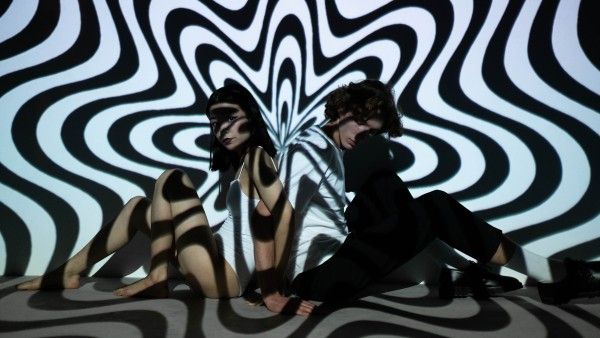Just In
- 7 min ago

- 7 hrs ago

- 16 hrs ago

- 18 hrs ago

Don't Miss
- Finance
 1:10 Split Coming Up: Crorepati FMCG ITC Turns Rs 1,50,000 To Rs 1.2 Crore; Makes Big Announcement; BUY?
1:10 Split Coming Up: Crorepati FMCG ITC Turns Rs 1,50,000 To Rs 1.2 Crore; Makes Big Announcement; BUY? - Sports
 Pakistan vs New Zealand Playing 11: PAK vs NZ 4th T20I Team News, Predicted Lineup And Other Details
Pakistan vs New Zealand Playing 11: PAK vs NZ 4th T20I Team News, Predicted Lineup And Other Details - Education
 JEE Main Result 2024 Out, Telangana's 15 Toppers Shine, Check Statewise List of 56 Candidates with Perfect 100
JEE Main Result 2024 Out, Telangana's 15 Toppers Shine, Check Statewise List of 56 Candidates with Perfect 100 - News
 Mangalsutra Row: Did Indira Gandhi Donate Gold During The 1962 War? The Facts Behind Priyanka's Claim
Mangalsutra Row: Did Indira Gandhi Donate Gold During The 1962 War? The Facts Behind Priyanka's Claim - Movies
 Kota Factory 3 OTT Release Date, Platform: When Will Jitendra Kumar's Web Series Premiere On Netflix?
Kota Factory 3 OTT Release Date, Platform: When Will Jitendra Kumar's Web Series Premiere On Netflix? - Travel
 Escape to Kalimpong, Gangtok, and Darjeeling with IRCTC's Tour Package; Check Itinerary
Escape to Kalimpong, Gangtok, and Darjeeling with IRCTC's Tour Package; Check Itinerary - Technology
 OPPO Find X7 Ultra Camera Deep-Dive: Pushing the Boundaries of Photography on a Smartphone
OPPO Find X7 Ultra Camera Deep-Dive: Pushing the Boundaries of Photography on a Smartphone - Automobiles
 Aston Martin Vantage Launched In India At Rs 3.99 Crore
Aston Martin Vantage Launched In India At Rs 3.99 Crore
What Is Psychedelic Therapy? Benefits And Risks Of The Future Of Mental Health Treatment
The term psychedelics by natch have a bad reputation - but when used under the proper guidance of a trained medical expert, the benefits it can have on the mental, emotional and physical wellbeing of an individual are many.
Psychedelic therapy is the procedure of using psychedelic drugs such as LSD, psilocybin, DMT, mescaline, 2C-B, and MDMA for therapeutic practices [1]. Hallucinogenic substances are used to aid the therapeutic process.
Warning: Never use psychedelic substances to self-treat.
What Is Psychedelic Therapy?
Psychedelic therapy has been used by Indigenous communities, shamans and medicine men in therapeutic and religious settings for centuries. However, it is relatively new in the Western clinical field.
It was after Albert Hofmann discovered the psychoactive properties of LSD (Lysergic acid diethylamide) in 1943, several research bodies and medical experts began experimenting with the application of psychedelics (both chemical and natural) for mental health treatments [2].
Psychedelic therapy is the use of plants and compounds (consciousness-altering) that can induce hallucinations to treat mental health associated health issues such as depression and post-traumatic stress disorder (PTSD) [3]. In psychedelic therapy, the use of psychedelics is combined with talk therapy.
The psychedelics used for this form of therapy are derived from plants, like psilocybin (magic mushrooms), DMT, peyote, ayahuasca, and ibogaine. Other psychedelics include chemical substances such as ketamine, MDMA, and LSD [4].

What Are The Types Of Psychedelic Therapy?
The types of psychedelic therapy include the following:
- Drug-assisted therapy: Where the therapist offers traditional treatments, such as psychotherapy, alongside psychedelics.
- Psychedelics alone: The use of only a psychedelic drug, with no additional treatment.
- Guided therapy: The therapist will guide the person through the "high," offering therapeutic suggestions and helping the person remain calm through the experience.
- Lysergic acid diethylamide (LSD) can cause altered mood, perception, and consciousness [5].
- MDMA or methylenedioxy-methylamphetamine, commonly termed as ecstasy produces psychedelic effects such as altered perceptions, increased arousal and feelings of euphoria.
- Psilocybin alters consciousness, mood, and perceptions.
- Ayahuasca, a brew made from the leaves of the Psychotria Viridis shrub along with the stalks of the Banisteriopsis caapi vine can help boost mood and alters perceptions.

Some common psychedelic substances used in psychedelic therapy are as follows:

What Are The Uses Of Psychedelic Therapy?
In the recent decade, a lot of studies have been done to understand the positive effect of psychedelics on mental and emotional health. Here are the uses of psychedelics in therapy:
- Anxiety [6]
- Depression [7]
- Substance use [8]
- Alcohol use [9]
- Post-traumatic stress disorder (PTSD) [10]
LSD: This potent psychedelic has been shown to help with both alcohol use disorder and anxiety in people living with terminal illnesses.
Psilocybin: The main component found in magic mushrooms, this substance can help treat depression and anxiety in people living with terminal illnesses.
MDMA: Studies have shown that MDMA can treat PTSD symptoms for up to 4 years, especially for people who have not responded to other forms of treatment.
Ketamine: One of the most studied psychedelic drugs in terms of mental health treatment, ketamine, when given in small doses have been shown to help treat depression [11]. However, the results are short-lived. Spravato, a nasal spray that possesses the active ketamine ingredient, is the first prescription nasal spray, taken with an oral antidepressant is the resultant of the numerous clinical studies on the effect of ketamine on depression [12].

DMT and mescaline are also used in psychedelic therapy.

What Are The Benefits Of Psychedelic Therapy?
The psychedelic drugs used for psychedelic therapy work by affecting the neural circuits that use the neurotransmitter serotonin and the benefits of this form of therapy include the following [13]:
- Feelings of relaxation for people suffering from terminal illnesses
- Improved sense of well-being
- Increased social connectedness
- Ease symptoms of depression and anxiety
- Ease effects of trauma in people with PTSD
- Ease symptoms of addiction
- May ease symptoms of eating disorders

What Are The Risks Of Psychedelic Therapy?
As these drugs have a powerful impact on the mind and the body, there are several risks associated with psychedelic therapy and they are as follows [14]:
- Psychedelics can elevate the heart rate and blood pressure, so people with cardiovascular issues are advised to discuss their history with a doctor before trying psychedelics.
- Hallucination can cause severe fear, paranoia, induce trauma and flashbacks.
- The break from reality can cause psychosis in some people.
- Altered sense of time.
- Distortions of reality and experiences.
- Intense emotions.
- Possible personality changes that can be long-term.

How Is Psychedelic Therapy Done? Who Can Undergo Psychedelic Therapy?
As studies are still being carried out to understand the extent of the impact of psychedelic therapy on mental health, the dosing, the number of treatments needed, and the approach to psychedelic therapy can vary from one therapist to another [15].
Psychedelic therapy commonly includes three stages, and they are consultation, ingestion and integration.
- In the first stage (consultation), the therapist will check the patient's medical history to understand possibilities of interactions and contradictions.
- In the second stage (ingestion), the psychedelic drug is ingested either orally or via injection under the supervision of a trained therapist. The ingestion session can vary according to the psychedelic and the treatment plan.
- The final stage (integration) is where the therapist and client work together to integrate meaning from the psychedelic experiences.
Although psychedelic treatment is not a primary form of treatment, researchers around the world are pushing for its application in treating people with addiction, depression, anxiety and posttraumatic stress disorder (PTSD).

How Is Psychedelic Therapy Different From Conventional Therapy?
In contrast to conventional therapy which requires an individual to take medication regularly or when required, psychedelic therapy requires the patients to remain in an extended psychotherapy session during the activity of the drug and spend the time at the therapy facility [16]. In psychedelic therapy, the therapists refrain from interpretation or explanation and encourage the patients to explore their inner experiences by themselves.
Is Psychedelic Therapy The Future For Mental Health Treatment?
With several studies and clinical trials done to thoroughly understand the positive impact of psychedelic drugs on mental health, the chances of psychedelic therapy being mainstream are not too far away. After decades of antidepressants failing to achieve their role in improving the mental well-being of individuals, neuroscientists and psychiatrists are rooting for the introduction of psychedelic therapy to treat depression, anxiety, addiction and more.
However, for Indians, this may be a pipedream - considering the treatment and exploitation of psychedelics in the country.
On A Final Note...
This article does not promote the recreational or non-supervised use of psychedelics or any hallucinogens. Psychedelic therapy should only be carried out under the guidance of a trained therapist. NEVER use psychedelic substances to self-treat.
Mental Health Helpline Numbers
1.
COOJ
Mental
Health
Foundation
(COOJ)-
Helpline:
0832-2252525
|
01:00
PM
-
07:00
PM
(
Monday
to
Friday)
2.
Parivarthan-
Helpline:
+91
7676
602
602
|
10:00
AM
to
10:00
PM
(Monday
to
Friday)
3.
Connecting
Trust-
Helpline:
+91
992
200
1122
|
+91-992
200
4305
|
12:00
PM
to
08:00
PM
(All
days
of
the
week)
4.
Roshni
Trust-
Helpline:
040-66202000,
040-66202001
|
11:00
AM
-
09:00
PM
(Monday
to
Sunday)
5.
Sahai
Helpline:
080-25497777
/
Email
at
-
[email protected]
|
10
AM-
8
PM
(Monday
to
Saturday)
6.
Sumaitri
Helpline:
011-23389090
/
[email protected]
|2
PM-
10
PM
(Monday
To
Friday);
10
AM
-
10
PM
(Saturday
and
Sunday)
7.
Sneha
Helpline:
044-24640050
(24
HOURS)
/
044-24640060
|
Email
at-
[email protected]
|8
AM
-
10
PM
8.
Lifeline
Helpline:
033-24637401
/
033-24637432
|
Email
at
[email protected]
|
10
AM
-
6
PM
-
 wellnessDid You Know Your Own Blood Can Be Used For Pain Relief?
wellnessDid You Know Your Own Blood Can Be Used For Pain Relief? -
 health5 Things To Try In Addition To Therapy For Mental Health Illnesses
health5 Things To Try In Addition To Therapy For Mental Health Illnesses -
 healthUncovering the Rise of Physiotherapy Practices in India
healthUncovering the Rise of Physiotherapy Practices in India -
 healthIs Yoga Better Than Therapy For Depression?
healthIs Yoga Better Than Therapy For Depression? -
 insyncA Creative Studio That Harmonizes Your Brand’s Strategy And Takes It To Therapy!
insyncA Creative Studio That Harmonizes Your Brand’s Strategy And Takes It To Therapy! -
 wellnessHow To Deal With Alcohol Withdrawal Syndrome
wellnessHow To Deal With Alcohol Withdrawal Syndrome -
 wellnessDid You Know? Stress Is Good For You! Here's Why
wellnessDid You Know? Stress Is Good For You! Here's Why -
 disorders cureStuttering: Types, Symptoms, Causes, Diagnosis And Treatment
disorders cureStuttering: Types, Symptoms, Causes, Diagnosis And Treatment -
 marriage and beyondMarriage Counselling: What Is It And How Does It Work
marriage and beyondMarriage Counselling: What Is It And How Does It Work -
 disorders cureAyurvedic Management Of Spondyloepiphyseal Dysplasia Tarda (SEDT)
disorders cureAyurvedic Management Of Spondyloepiphyseal Dysplasia Tarda (SEDT) -
 disorders cureBudwig Diet: Is It Effective Against Cancer?
disorders cureBudwig Diet: Is It Effective Against Cancer? -
 disorders cureBiofeedback Therapy: Types, Procedure & Uses
disorders cureBiofeedback Therapy: Types, Procedure & Uses


 Click it and Unblock the Notifications
Click it and Unblock the Notifications



